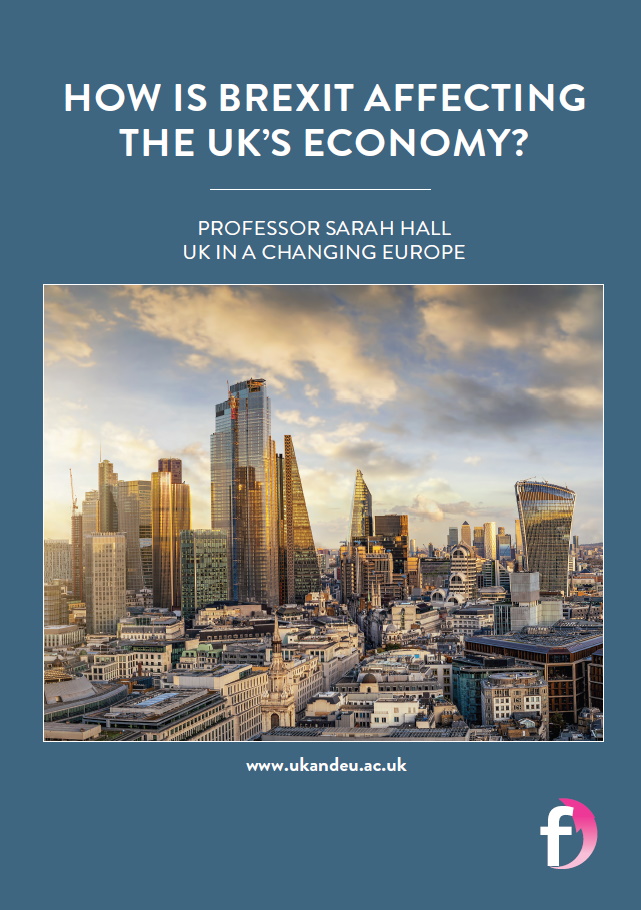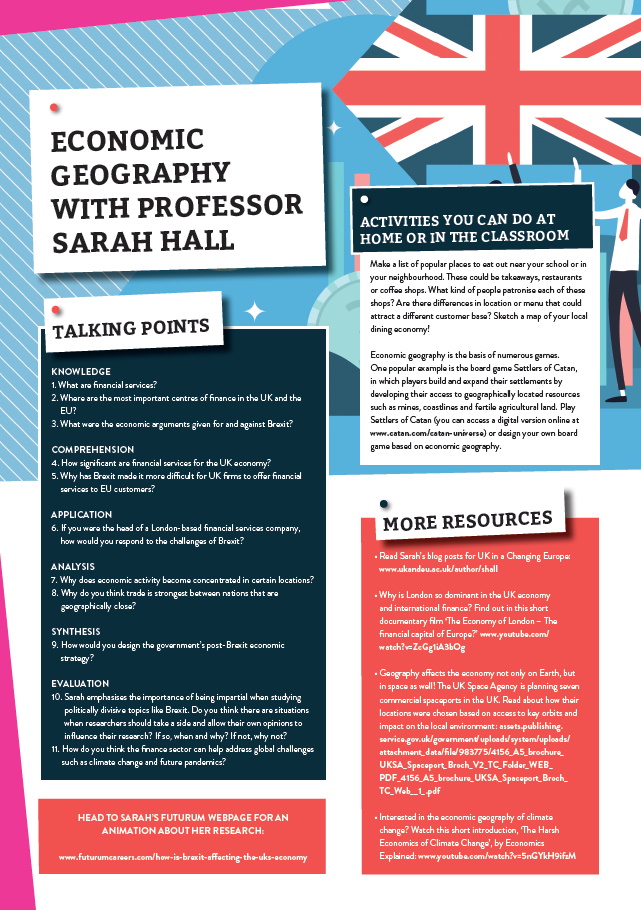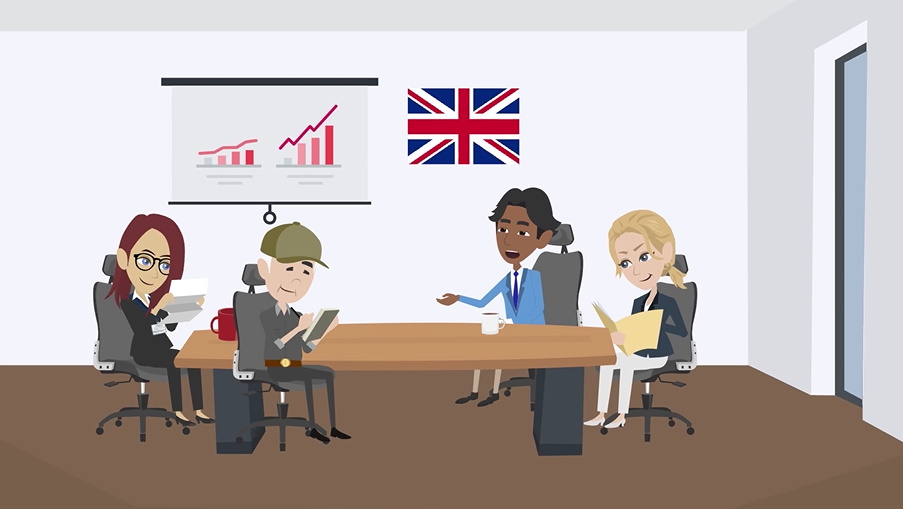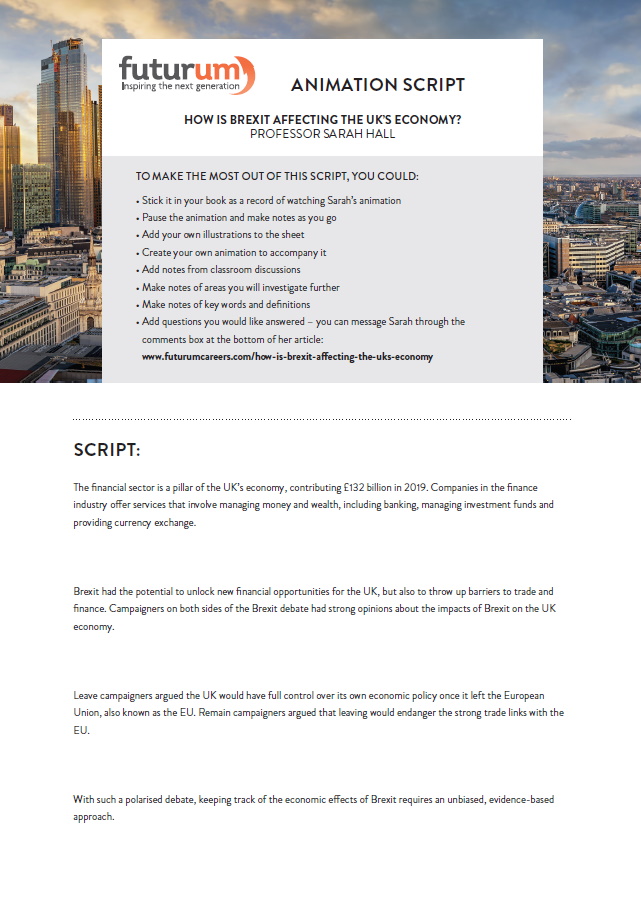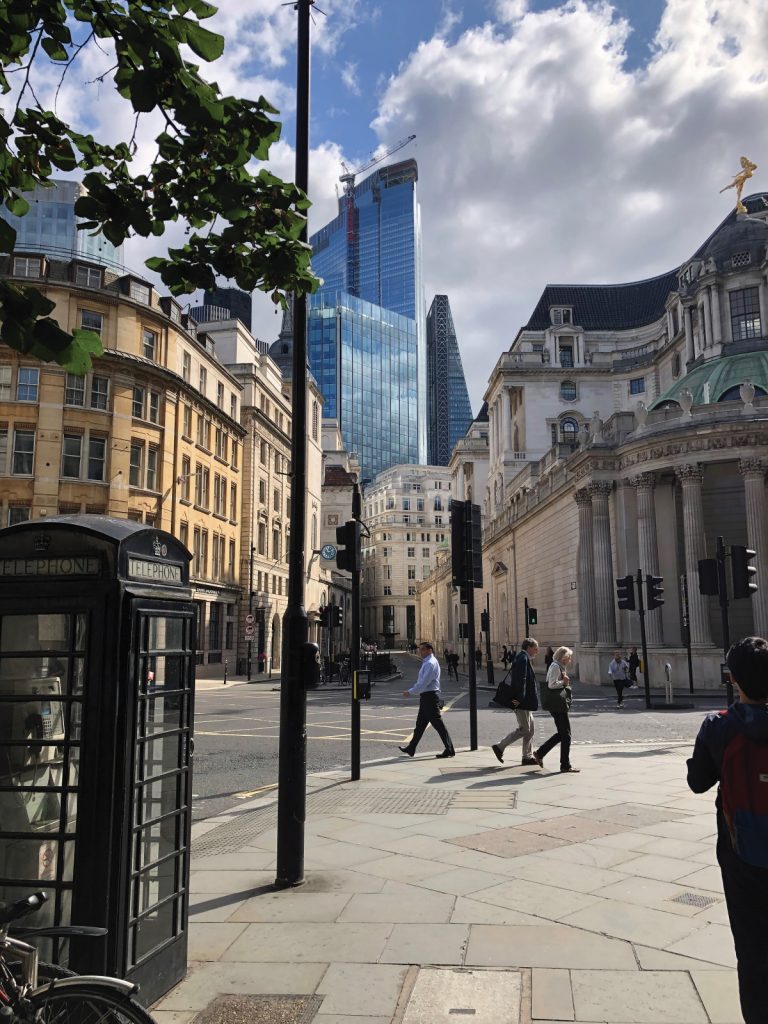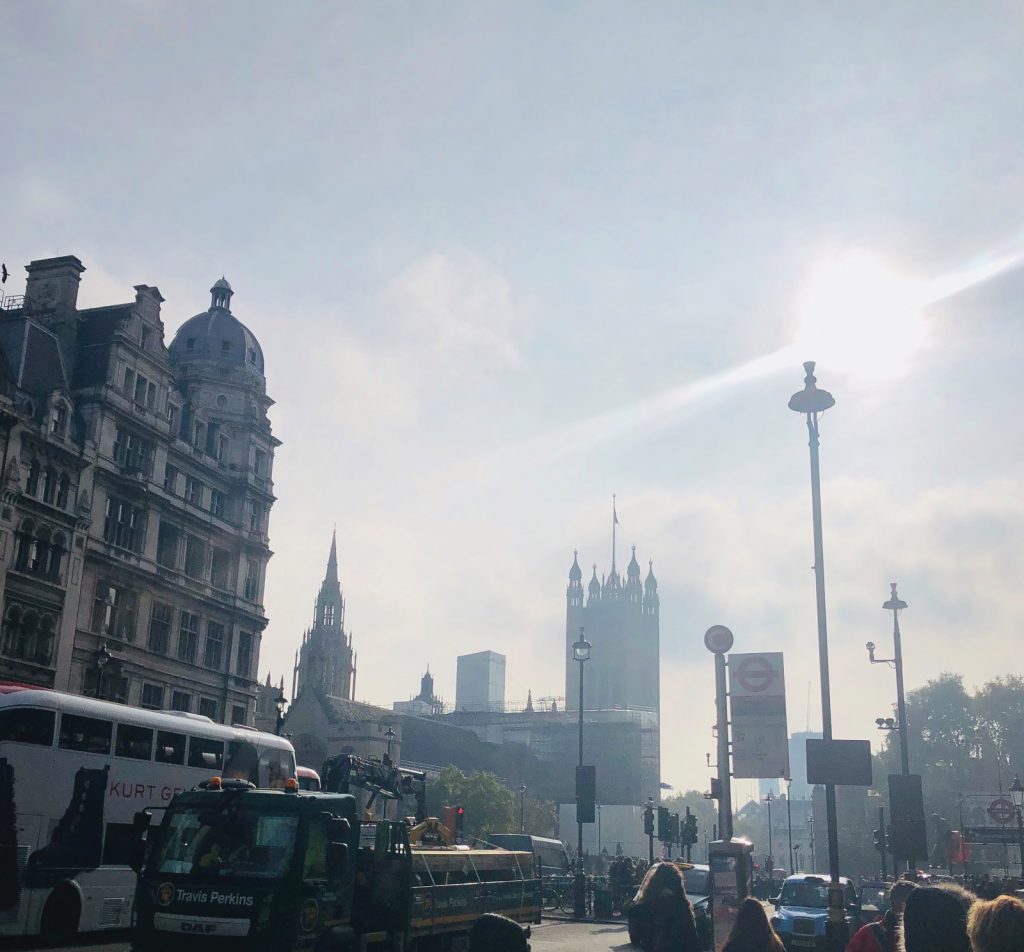How is Brexit affecting the UK’s economy?
The UK’s exit from the European Union created a new border, not only to people and goods, but to finance. Professor Sarah Hall, an economic geographer at the University of Nottingham in the UK, is studying the effects of Brexit on the financial services we use every day
TALK LIKE AN ECONOMIC GEOGRAPHER
BREXIT – the UK’s withdrawal from the European Union
ECONOMIC GROWTH – an increase in the value of the goods and services produced by the economy over time
EUROPEAN UNION (EU) – a group of 27 European countries that share political and economic laws, including the ability of member countries to freely trade with each other
FINANCIAL SERVICES – services offered by the finance industry involving the management of money and assets, including opening bank accounts, tax preparation and management, and investment services
GROSS DOMESTIC PRODUCT (GDP) – the total value of all goods and services produced by a country
LEAVE – the campaign for the UK to leave the EU
PASSPORTING – an arrangement in which a financial services firm registered in the EU can do business in any other EU country without requiring further authorisation from that country
REMAIN – the campaign for the UK to remain in the EU
The financial sector is a pillar of the UK’s economy. Brexit had the potential to unlock new financial opportunities, but also to throw up new barriers to trade and finance. With such a polarised debate, how can we keep track of the real economic effects of Brexit? Professor Sarah Hall is an economic geographer at the University of Nottingham and a member of the UK in a Changing Europe research group, an organisation providing impartial analysis about all aspects of Brexit. She is investigating the consequences of Brexit for the UK’s financial sector.
WHAT ARE FINANCIAL SERVICES?
Companies in the finance industry offer a broad range of services that involve managing money and wealth. These financial services include banking, taking deposits, providing insurance, managing payments, transferring funds between accounts, issuing credit and debit cards, managing investment funds and providing currency exchange. In 2019, financial services contributed £132 billion to the UK economy, nearly 7% of the UK’s total economic output. About half of this value was generated in London, with the rest spread primarily between cities such as Edinburgh, Leeds and Manchester. In early 2020, the finance industry employed 1.1 million people, accounting for 3.2% of the UK’s jobs. The UK offers many of its financial services to customers abroad, running a trade surplus in this sector of £41 billion in 2019.
PREDICTED IMPACTS OF BREXIT
Because financial services are an important part of the UK economy, and because financial trade is international, campaigners on both sides of the Brexit debate had strong opinions about the impacts of Brexit on UK finances. Leave campaigners argued the UK would have full control over its own economic policy once it left the EU, including regulation of the finance sector. Remain campaigners argued that the UK has strong trade links with the EU, its closest neighbour and largest trading partner, and that leaving the EU would endanger these links and reduce prosperity.
The heated nature of the Brexit debate makes it important for researchers like Sarah to take an impartial, evidence-based approach to understanding the consequences (both the challenges and the opportunities) of Brexit. “To make the best policy, to have the most informed public debate and to make decisions about what should happen next, we need information and analysis that tries to step back, assess what has happened and explain what the options are from an impartial viewpoint,” Sarah says.
HOW DOES SARAH STUDY THE FINANCIAL SECTOR?
Economic geographers rely on both theory and data in their research. One theory Sarah is using to interpret the effects of Brexit is the ‘gravity model of trade’. This model posits that trade will be strongest between countries that are geographically close to each other. For example, the UK’s biggest trading partner is the EU, its closest geographical neighbour. Post-Brexit, the government may aim to increase trade with non-EU partners like Australia, Canada and New Zealand. However, the gravity model predicts that the distance to these countries will make it more difficult to build strong trading relationships.
The bedrock of Sarah’s research is data, with important statistics sourced from the government and other financial institutions. This kind of data includes the number of offices in the UK, how many people are employed, where financial services are being exported to and similar ‘big picture’ information. Sarah also talks to people, interviewing financiers, policymakers and trade bodies to get a feel for what the facts and figures mean to individuals. “This is a part of the research process that I really enjoy,” Sarah says. “We get to speak to people who are working in the finance sector and learn from them about the challenges and opportunities for financial services resulting from Brexit.”
THE IMPACT OF BREXIT ON FINANCIAL SERVICES
Brexit has made it more difficult for the UK to export financial services to the EU. In the past, the practice of ‘passporting’ allowed UK companies to easily trade with customers in any other country in the EU. After Brexit, UK companies have lost this convenience. “Market access is now allowed on a temporary basis from the EU to the UK,” Sarah explains. “But UK firms are now reliant on the EU deciding which parts of financial services will have temporary access to the EU market without additional regulatory checks. This doesn’t cover the same range of activities that were covered by passporting and it isn’t as stable.”
Reference
https://doi.org/10.33424/FUTURUM246
BREXIT – the UK’s withdrawal from the European Union
ECONOMIC GROWTH – an increase in the value of the goods and services produced by the economy over time
EUROPEAN UNION (EU) – a group of 27 European countries that share political and economic laws, including the ability of member countries to freely trade with each other
FINANCIAL SERVICES – services offered by the finance industry involving the management of money and assets, including opening bank accounts, tax preparation and management, and investment services
GROSS DOMESTIC PRODUCT (GDP) – the total value of all goods and services produced by a country
LEAVE – the campaign for the UK to leave the EU
PASSPORTING – an arrangement in which a financial services firm registered in the EU can do business in any other EU country without requiring further authorisation from that country
REMAIN – the campaign for the UK to remain in the EU
The financial sector is a pillar of the UK’s economy. Brexit had the potential to unlock new financial opportunities, but also to throw up new barriers to trade and finance. With such a polarised debate, how can we keep track of the real economic effects of Brexit? Professor Sarah Hall is an economic geographer at the University of Nottingham and a member of the UK in a Changing Europe research group, an organisation providing impartial analysis about all aspects of Brexit. She is investigating the consequences of Brexit for the UK’s financial sector.
WHAT ARE FINANCIAL SERVICES?
Companies in the finance industry offer a broad range of services that involve managing money and wealth. These financial services include banking, taking deposits, providing insurance, managing payments, transferring funds between accounts, issuing credit and debit cards, managing investment funds and providing currency exchange. In 2019, financial services contributed £132 billion to the UK economy, nearly 7% of the UK’s total economic output. About half of this value was generated in London, with the rest spread primarily between cities such as Edinburgh, Leeds and Manchester. In early 2020, the finance industry employed 1.1 million people, accounting for 3.2% of the UK’s jobs. The UK offers many of its financial services to customers abroad, running a trade surplus in this sector of £41 billion in 2019.
PREDICTED IMPACTS OF BREXIT
Because financial services are an important part of the UK economy, and because financial trade is international, campaigners on both sides of the Brexit debate had strong opinions about the impacts of Brexit on UK finances. Leave campaigners argued the UK would have full control over its own economic policy once it left the EU, including regulation of the finance sector. Remain campaigners argued that the UK has strong trade links with the EU, its closest neighbour and largest trading partner, and that leaving the EU would endanger these links and reduce prosperity.
The heated nature of the Brexit debate makes it important for researchers like Sarah to take an impartial, evidence-based approach to understanding the consequences (both the challenges and the opportunities) of Brexit. “To make the best policy, to have the most informed public debate and to make decisions about what should happen next, we need information and analysis that tries to step back, assess what has happened and explain what the options are from an impartial viewpoint,” Sarah says.
HOW DOES SARAH STUDY THE FINANCIAL SECTOR?
Economic geographers rely on both theory and data in their research. One theory Sarah is using to interpret the effects of Brexit is the ‘gravity model of trade’. This model posits that trade will be strongest between countries that are geographically close to each other. For example, the UK’s biggest trading partner is the EU, its closest geographical neighbour. Post-Brexit, the government may aim to increase trade with non-EU partners like Australia, Canada and New Zealand. However, the gravity model predicts that the distance to these countries will make it more difficult to build strong trading relationships.
The bedrock of Sarah’s research is data, with important statistics sourced from the government and other financial institutions. This kind of data includes the number of offices in the UK, how many people are employed, where financial services are being exported to and similar ‘big picture’ information. Sarah also talks to people, interviewing financiers, policymakers and trade bodies to get a feel for what the facts and figures mean to individuals. “This is a part of the research process that I really enjoy,” Sarah says. “We get to speak to people who are working in the finance sector and learn from them about the challenges and opportunities for financial services resulting from Brexit.”
THE IMPACT OF BREXIT ON FINANCIAL SERVICES
Brexit has made it more difficult for the UK to export financial services to the EU. In the past, the practice of ‘passporting’ allowed UK companies to easily trade with customers in any other country in the EU. After Brexit, UK companies have lost this convenience. “Market access is now allowed on a temporary basis from the EU to the UK,” Sarah explains. “But UK firms are now reliant on the EU deciding which parts of financial services will have temporary access to the EU market without additional regulatory checks. This doesn’t cover the same range of activities that were covered by passporting and it isn’t as stable.”
Since UK finance companies can no longer sell their services to customers in EU countries from their UK offices, many have opened new offices and moved operations, employees and assets to other countries in the EU. Research estimates that about 7,500 finance jobs have left London so far – a small proportion of the existing 1 million jobs, and fewer than predicted, though moves may continue. These finance jobs have been moved from London to Paris, Amsterdam, Dublin and Frankfurt, but London still remains the main hub for financial services in Europe.
The economic effects of Brexit extend beyond the finance sector. UK consumers have experienced empty shelves in shops caused by labour shortages in supply chains. Some UK citizens living in the EU have had to change banks because their UK-based banks could no longer provide them with accounts after losing passporting rights. Overall, Sarah says, “Recent estimates from the government suggest that GDP will be 4% lower in the medium-term as a result of Brexit. This compares with a 2% decline due to COVID, suggesting that we will be seeing the economic impacts of Brexit for longer than those of COVID.”
WHAT NEXT FOR THE UK ECONOMY?
Sarah sees financial services as a microcosm of the UK’s economic growth strategy after Brexit and COVID. “Can the UK build back better from COVID and level-up persistent regional imbalances in productivity?” she asks. With its new freedom to craft its own financial regulations, the government is hoping to stimulate emerging areas in the financial sector, such as green finance and digital finance. However, as the country’s economic geography develops, Sarah and other researchers in the field will continue to conduct the impartial analysis we need to make sound economic decisions in the future.
 PROFESSOR SARAH HALL
PROFESSOR SARAH HALL
Professor of Economic Geography, University of Nottingham, UK
UK IN A CHANGING EUROPE
www.ukandeu.co.uk
FIELD OF RESEARCH: Economic Geography
RESEARCH PROJECT: Understanding the impact of Brexit on the UK’s financial services
FUNDER: Economic and Social Research Council (ESRC)
This work is supported by the ESRC under award number ES/T000821/1. The contents are solely the responsibility of the author and do not necessarily represent the official views of the ESRC.
 PROFESSOR SARAH HALL
PROFESSOR SARAH HALL
Professor of Economic Geography, University of Nottingham, UK
UK IN A CHANGING EUROPE
www.ukandeu.co.uk
Economic Geography
FIELD OF RESEARCH: Understanding the impact of Brexit on the UK’s financial services
FUNDERS: Economic and Social Research Council (ESRC)
This work is supported by the ESRC under award number ES/T000821/1. The contents are solely the responsibility of the author and do not necessarily represent the official views of the ESRC.
ABOUT ECONOMIC GEOGRAPHY
Economic geographers study how the location of an economic activity affects what that economic activity looks like – who does it, how profitable it is, how it changes over time, and how it affects social and political life. For example, economic activity in the UK is concentrated in London, which dominates the UK’s economy and is an international leader in the finance industry. Economic geographers investigate why this is.
Economic geography is a branch of human geography and is closely linked to fields such as urban geography. Economic geographers have the opportunity to collaborate with researchers in different disciplines, as the issues studied in economic geography are often influenced by political, social and environmental factors. For example, topics of study in economic geography vary from country-scale issues, such as how borders affect trade and finance, to smaller-scale questions, such as how soil properties determine where productive agricultural regions develop or why gentrification occurs in particular neighbourhoods.
WHAT DOES AN ECONOMIC GEOGRAPHER’S DAY LOOK LIKE?
For economic geographers, no two days are alike! Research may involve collecting data by interviewing financiers and combing through government statistics. Academics also spend time writing academic papers and blogs to publicise their results and writing policy documents to ensure their research is implemented in government policies. Sarah also spends time teaching students, helping to run the teaching activities of her department, meeting with colleagues and networking with other academics. “As an academic researcher, you have a lot of flexibility to manage your time, which is great,” says Sarah. “But you do need to be organised to work out what is a priority.”
WHY SHOULD YOU BECOME AN ECONOMIC GEOGRAPHER?
Geography is a broad subject that connects to many other fields. That breadth makes it a great option for people who enjoy both humanities and mathematical subjects. Economic geography is of increasing importance in our global economy and is coming to the attention of policymakers. “The UK’s Chancellor of the Exchequer, Rushi Sunak, even mentioned economic geography in the 2021 Budget!” says Sarah. A career in economic geography offers intellectual freedom and the opportunity to contribute to understanding some of the world’s most pressing problems.
EXPLORE A CAREER IN ECONOMIC GEOGRAPHY
• Sarah recommends exploring the resources, activities and events provided by the Royal Geographical Society (www.rgs.org) or reaching out to your local university to find events for young people interested in careers in geography.
• Specialising in economic geography will open opportunities in finance and economic analysis, or you could become an academic like Sarah and study the aspects of economic geography that most interest you.
• This article discusses some of the topics studied by economic geographers: www.marketbusinessnews.com/financial-glossary/economic-geography
• Most university geography courses are very flexible in terms of subjects studied at school before beginning a degree. Sarah emphasises that you should study the subjects you enjoy rather than worrying about taking the ‘right’ courses. As an interdisciplinary subject, breadth of knowledge and interest is important in geography. “I studied a complete mix of subjects at school – geography, maths, music and French,” says Sarah.
• Most universities offer undergraduate and postgraduate degrees in geography. Some universities will allow you to specialise in economic geography or take a dual degree in geography and economics.
• An undergraduate or master’s degree will be sufficient for most economic geography jobs outside academia, but a PhD is required to become a professor like Sarah.
HOW DID SARAH BECOME AN ECONOMIC GEOGRAPHER?
WHAT WERE YOUR INTERESTS WHEN YOU WERE YOUNGER?
Music was a huge part of my life at school, and I nearly became a professional musician rather than going to university! I frequently travelled from my small, Teesside village to London to learn and perform, which really opened my eyes to the differences within the UK – sometimes it felt like going to a different country. I think this was really important in my decision to study geography – I was interested in why the same policies could have such different impacts in different places.
WHAT INSPIRED YOU TO BECOME AN ECONOMIC GEOGRAPHER?
I grew up in the northeast of England at a time when my local economy was rapidly deindustrialising. I became fascinated by why this was happening and why the experience of where I lived was so different to places like London.
WHAT ARE YOUR PROUDEST CAREER ACHIEVEMENTS SO FAR?
One of the things I love about my job is the variety, so the things I’m most proud of are equally varied: having two books published (one finished during the COVID lockdown when I was also home-schooling my three children), providing analysis to assist with post-Brexit policymaking and supporting early career researchers.
WHY DO YOU FIND FINANCIAL SERVICES AND SYSTEMS SO INTERESTING?
They’re a central part of the UK economy but are really unevenly distributed. They are important across the whole economy but are dominated in London. I really think that understanding them can provide us with lots of insights into bigger issues like uneven regional growth in the UK and how the UK’s position within the world economy will change post-Brexit.
WHAT DO YOU ENJOY DOING OUTSIDE OF WORK?
I love running, Pilates and reading, but my biggest commitments outside of my research are being a mum to my three young children – I spend a lot of time running a family taxi service! As a result, I’m determined to work to support careers for parents in research.
SARAH’S TOP TIPS
01 Do what you enjoy.
02 Work hard.
03 Be inquisitive about the world around you!
Do you have a question for Sarah?
Write it in the comments box below and Sarah will get back to you. (Remember, researchers are very busy people, so you may have to wait a few days.)

